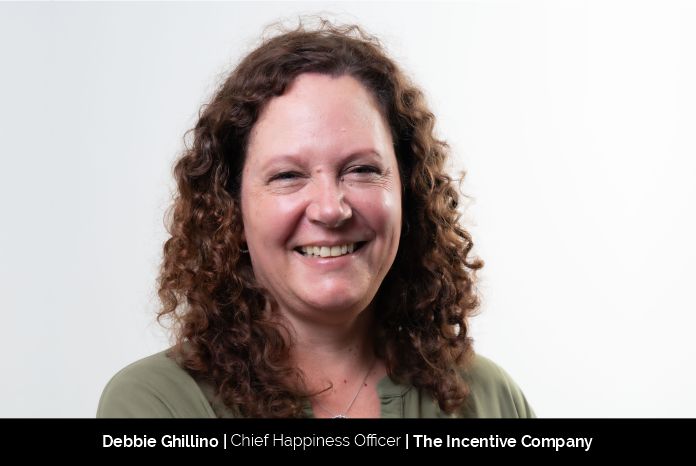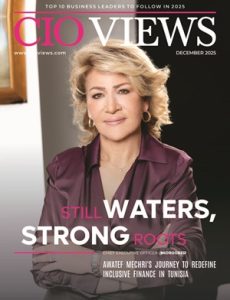In the dynamic world of business, fostering a culture of happiness and motivation is crucial for success. Debbie Ghillino, the Chief Happiness Officer at The Incentive Company, has dedicated her career to improving employee performance and satisfaction. Her journey, strategies, and insights provide a valuable blueprint for other leaders aiming to create a positive and productive work environment. Through her innovative approaches and unwavering commitment, Debbie has transformed The Incentive Company into a model of employee engagement and corporate responsibility.
Journey to Chief Happiness Officer
Debbie Ghillino’s path to becoming the Chief Happiness Officer at The Incentive Company is a testament to her dedication and vision. “I have worked in the industry for many years, both locally and internationally,” she explains. Her extensive experience and desire to do things differently led her to focus on creating a female-led organization that emphasizes a real work-life balance, especially for working mothers. This unique perspective has been instrumental in shaping the company’s culture and success.
Debbie’s journey is marked by her determination to create an environment where employees feel valued and supported, which she believes is essential for achieving both personal and professional fulfillment.
Passion for Performance and Rewards
Debbie’s passion for the industry is evident in her approach to improving people’s performance and rewarding their efforts. “I love the fact that we ask people to perform better and then we reward them for achieving excellence,” she asserts. This positive reinforcement not only boosts individual performance but also enhances overall client satisfaction. By aligning rewards with performance, Debbie ensures that everyone benefits from the system. Her belief in the power of positive reinforcement is reflected in the numerous successful incentive programs she has implemented, which have consistently driven high levels of engagement and productivity among employees.
Debbie employs several strategies to keep her employees motivated and engaged. Her mantra is simple yet effective: “Employ people better than you, and then, train, trust, empower, and get out of their way.”
By allowing her team to work from home and focusing on outcomes rather than hours, she provides the flexibility needed for a healthy work-life balance. Regular team gatherings, such as cake and chat sessions, further strengthen team bonds and morale. These strategies not only enhance productivity but also foster a sense of community and belonging among employees, which are key drivers of long-term engagement and loyalty.
Defining Success
For Debbie, success as a Chief Happiness Officer is measured by the happiness and empowerment of her team. “If my team is happy, empowered, and able to do their jobs in a safe and supported environment, then I feel successful,” she says. She prioritizes creating a fun and cohesive team environment, which is essential for maintaining high levels of motivation and engagement. Debbie’s definition of success goes beyond traditional metrics; it encompasses the well-being and satisfaction of her employees, which she believes are critical components of a thriving organization.
Linking Employee Happiness to Customer Satisfaction
One of the key aspects of Debbie’s role is designing successful incentive programs. “The most successful incentives are when the audience is engaged and enticed by the aspirational reward,” she explains. By ensuring that the user journey is simple, and the client’s needs are met in terms of ROI, Debbie creates programs that drive desired behaviors and deliver measurable results. Her approach to incentive programs is grounded in a deep understanding of human motivation and behavior, which allows her to design initiatives that are both effective and sustainable. These programs not only reward employees for their achievements but also inspire them to strive for continuous improvement.
Debbie firmly believes that employee happiness is directly linked to customer satisfaction. “When you have an employee who is engaged in their role and motivated to provide excellent service, then the customer is way more satisfied,” she states. This connection underscores the importance of fostering a positive work environment to achieve better business outcomes.
Debbie’s insights highlight the symbiotic relationship between employee well-being and customer satisfaction, which is a cornerstone of her leadership philosophy. By prioritizing the happiness and engagement of her employees, she ensures that they are motivated to deliver exceptional service, which in turn drives customer loyalty and business success.
Overcoming Challenges
Promoting a culture of happiness and motivation comes with its challenges. “Sadly, there are still lots of leaders who don’t understand that happy staff = happy customers,” Debbie notes. Hiring the right people, empowering them, and creating a safe environment where they can voice concerns are crucial steps in overcoming these challenges. Leadership that genuinely cares about its teams is essential for reaping the rewards of an engaged and motivated workforce.
Debbie’s approach to overcoming these challenges is rooted in her belief that trust and empowerment are fundamental to creating a positive and productive work environment. By fostering a culture of openness and support, she ensures that her team feels valued and motivated to perform at their best.
Staying Updated with Trends
To stay updated with the latest trends and best practices in employee engagement and motivation, Debbie relies on industry bodies and trade groups. “We belong to the IMA (Incentive Marketing Association) in the USA, Europe, and I am on the board for the newly formed MEA-APAC regional chapter,” she shares. This involvement ensures that she remains at the forefront of industry developments and can implement cutting-edge strategies.
Debbie’s commitment to continuous learning and professional development is a testament to her dedication to excellence. By staying informed about the latest trends and best practices, she ensures that her strategies are always relevant and effective.
Advice for Business Leaders
Debbie’s advice for other business leaders is straightforward: “Listen to your teams, understand their frustrations. Genuinely care for them, and support them.” Creating an environment where employees feel heard and valued is crucial for improving performance and satisfaction. Implementing fair and credible reward and recognition programs, along with wellness initiatives, can significantly enhance employee engagement. Debbie’s advice underscores the importance of empathy and support in leadership. By prioritizing the well-being of their teams, leaders can create a positive and productive work environment that drives long-term success.
The Future of the Chief Happiness Officer Role
Looking ahead, Debbie sees the role of the Chief Happiness Officer evolving with the changing workforce dynamics. “With GenZ in the workplace and some already moving into managerial roles, the role of rewards and recognition in the workplace will become more and more important,” she predicts. The newer generations expect their employers to care about them beyond just paying their salary, emphasizing sustainability, community involvement, and personal development.
Debbie’s vision for the future highlights the growing importance of holistic employee engagement strategies that address the diverse needs and expectations of the modern workforce. By staying attuned to these trends, she ensures that her leadership approach remains relevant and impactful.
Debbie’s mission to create a happy and motivated workforce is guided by her deep care for her team. “I support them and would walk over hot coals for them,” she exclaims. Her commitment to serving and growing her team is evident in her leadership style, which focuses on nurturing and empowering individuals to achieve their best. Debbie’s personal values and principles are the foundation of her leadership philosophy. By prioritizing the well-being and development of her team, she creates a positive and supportive work environment that drives both individual and organizational success.
Conclusion
Debbie Ghillino’s approach to leadership at The Incentive Company highlights the importance of creating a culture of happiness and motivation. Her strategies and insights provide a valuable roadmap for other leaders looking to enhance employee performance and satisfaction. By prioritizing employee well-being and fostering a supportive environment, Debbie demonstrates that happy employees lead to happy customers and, ultimately, a successful business. Her dedication to creating a positive and productive work environment serves as an inspiration for leaders across industries, showcasing the transformative power of empathy, trust, and empowerment in driving organizational success.





